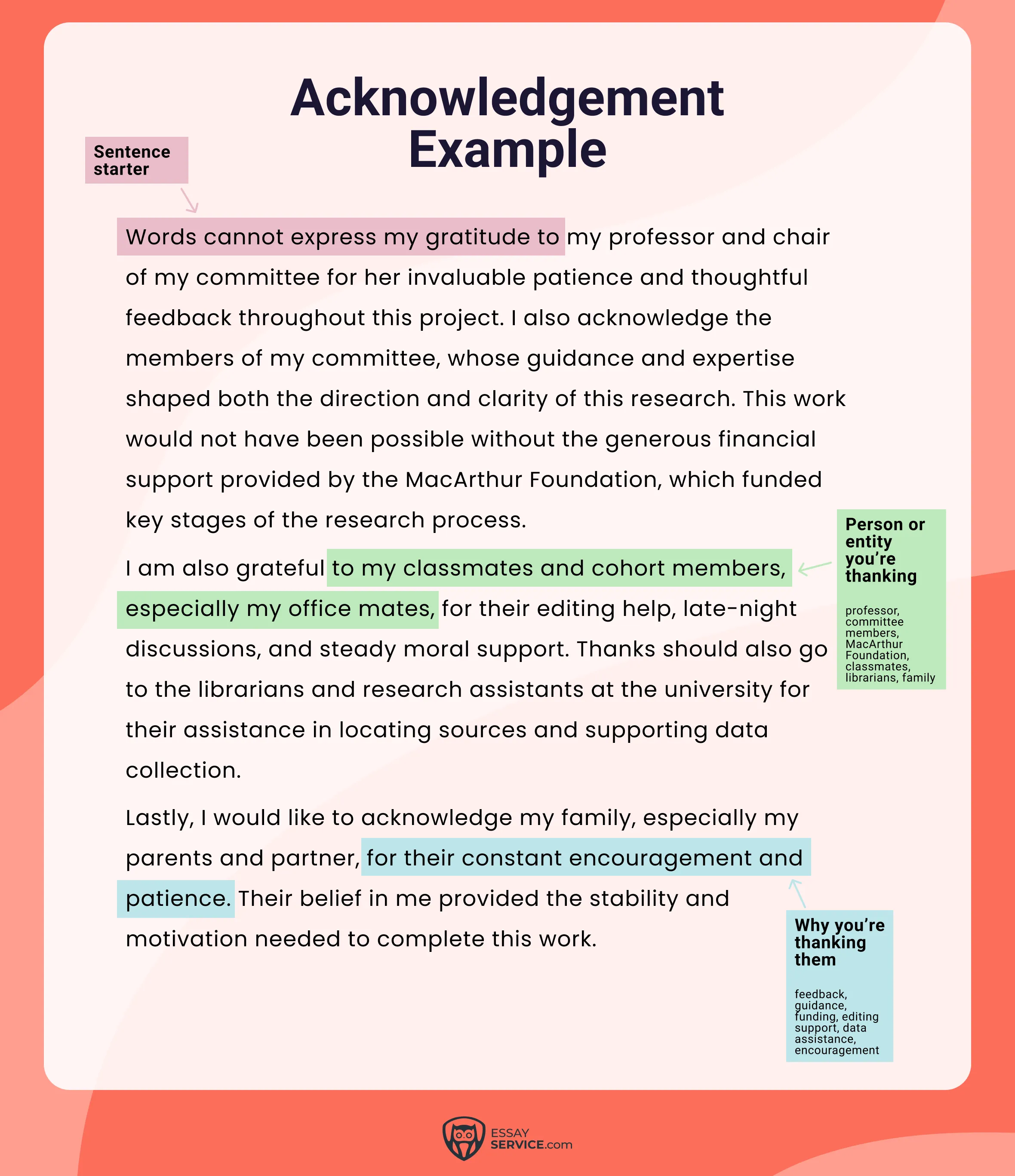A research paper acknowledgement is a short, formal paragraph that thanks academic contributors first (such as advisors, research assistants, and funding agencies), followed by personal supporters like family or friends. The key is specificity. State how each person helped, whether through statistical analysis, data collection, funding, or steady encouragement, and keep the tone professional and restrained.
This article explains how to acknowledge correctly, with examples, templates, and practical guidance. For tight deadlines or complex projects, EssayService offers support, including the option to pay for a research paper that follows academic standards.
Acknowledgement for Research Paper Template
This acknowledgement in research paper template is designed to make the process simple and structured. The PDF walks you through who to thank, how to phrase the acknowledgements section professionally, and how to organize them correctly. It’s free to use and works for research papers, theses, and dissertations.
Who to Acknowledge in a Research Paper?
Acknowledgements usually fall into two categories: professional and personal. The standard order matters. Start with academic contributors who shaped the work, then note institutional or financial support, and finish with technical or personal acknowledgements. This keeps the section clear and respectful.
Professional acknowledgements (first):
- Advisor or supervisor
- Committee members
- Funding agencies or institutions
- Research assistants, librarians, data or statistical support
Personal acknowledgements (last):
- Family members
- Friends or partners
For guidance on structuring related sections, see the methodology section in research paper.
Professional Acknowledgements: Academic and Research Contributions
This is where you recognize intellectual guidance, material support, and technical assistance that directly shaped the project. The tone should be formal, measured, and factual.
Who to acknowledge:
- Advisor or supervisor
- Committee members
- Funding agencies or funding bodies
- Research assistants
- Librarians, statisticians, or technical staff
- Institutions, laboratories, or organizations
How to mention them:
- Use full names and official titles when relevant.
- Be precise about contributions, such as experimental design, statistical analysis, or manuscript feedback.
- Follow specific guidelines for naming grants or funding sources.
Who not to acknowledge:
- Co-authors, whose contributions are already reflected in the authorship
- Supervisors or reviewers who had no direct involvement
- Individuals mentioned out of courtesy rather than contribution
Personal Acknowledgements: Support Beyond the Research
Personal acknowledgements are where the research steps briefly out of abstraction and back into real life. Long projects rarely happen in isolation, and this section quietly reflects the emotional steadiness and practical help that carried the work through months of drafting, doubt, and revision. The tone can soften here, but it still lives inside an academic document, so restraint matters. A few measured lines do more than a long explanation ever could.
Who to acknowledge:
- Family members
- Partners or close friends
- Individuals who contributed indirectly
How to mention them:
- Keep statements brief and sincere.
- Focus on support rather than personal stories.
- Avoid language that shifts the tone away from academic writing.
Who not to acknowledge:
- Casual acquaintances
- Anyone whose inclusion could raise questions of professionalism or relevance
For an early-stage reference, this research proposal example explains how acknowledgements and other sections fit into academic structure.
How to Write an Acknowledgement for Research Paper
Writing an acknowledgement for a research paper works best when you follow a clear structure:
- Map your support system before you write
- Open with a neutral, professional statement in the first person
- Lead with the most formal recognition
- Recognize professional and technical contributions
- Close with personal gratitude
- End with a collective note of thanks
- Check style and formatting requirements
Step 1: Map Your Support System Before You Write
Before drafting a single sentence, pause and inventory everyone who contributed to the work. A professional acknowledgement hierarchy identifies all contributors first, then organizes them into clear groups so nothing important is misplaced.
Formal support
Funding bodies, university departments, supervisors, or institutions that shaped the project’s direction or provided resources.
Technical support
Lab assistants, librarians, editors, or anyone who helped with methods, data, or tools.
Personal support
Family, friends, or study groups who supported you outside the research itself.
Step 2: Open With a Neutral, Professional Statement
Start with a single sentence that opens the door without rushing anyone through it. This line should acknowledge support in general terms and signal that what follows is deliberate, not ceremonial.
Common sentence starters like “This work benefited from the support and guidance of many individuals” work well here. It’s restrained, professional, and leaves room to move naturally into specific contributors without sounding scripted or inflated.
Step 3: Lead With the Most Formal Recognition
The first paragraph is reserved for the heavy hitters. This is where academic protocol matters. Always begin with funding agencies or grants, then move directly to your primary supervisor or advisor. These contributions form the foundation of the research and should appear before any other acknowledgements.
Step 4: Recognize Professional and Technical Contributions
Not every contribution reshapes a project, but many make it workable. This part of the acknowledgement section in research paper is for those who stepped in with access, tools, or specialized know-how at exactly the right moment. Lab technicians who kept experiments running, librarians who uncovered hard-to-find sources, or experts who clarified a narrow technical issue all belong here.
The rule is restraint. Name the help, explain its function, and move on. A line like “Special thanks to the [Department Name] for providing access to…” keeps the focus on contribution rather than sentiment, which is exactly where this section should stay.
Step 5: Close With Personal Gratitude
This comes last for a reason. After the academic and technical contributions are acknowledged, there’s room to recognize the people who supported the work quietly, outside the research itself. This is where authors thank their personal support system, including a spouse, parents, close family members, or a small circle of friends.
Keep it grounded. Brief, sincere mentions are enough to signal appreciation without shifting the tone of the paper. Avoid inside jokes, long stories, or emotional detail.
Step 6: End With a Collective Note of Thanks
Wrap the acknowledgements with a short closing sentence that brings everyone together. This line should recognize the shared effort behind the work rather than introduce new names or details. A brief statement of collective gratitude signals completion, reinforces professionalism, and leaves the section feeling deliberate instead of abrupt.
Step 7: Check Style and Formatting Requirements
Before finalizing the acknowledgement on research paper, review the formatting rules required by your citation style:
Final checks:
- Confirm the correct spelling of all names.
- Use appropriate professional titles where relevant.
- Keep the length concise and proportional to the paper.
- Follow any journal or university-specific rules exactly.
Acknowledgement Phrase Bank for Research Papers
This phrase bank helps you write acknowledgements that sound professional, specific, and appropriate for academic work. Use these expressions as flexible building blocks. Adjust names and contributions as needed, but keep the tone measured and formal.
Example of Acknowledgement in Research Paper
This acknowledgements section example shows how a well-written section is structured and how each sentence serves a specific purpose.

Another Acknowledgement Example for Research Paper
Below are two files, each with an example of acknowledgement in research paper PDF. Download and review for free.
Mistakes to Avoid When Writing an Acknowledgement for a Research Paper
The points below highlight the most common mistakes students should avoid:
- Thanking people out of order, placing personal acknowledgements before academic or financial support.
- Using vague language instead of stating specific contributions.
- Including people who had no direct involvement in the research.
- Writing in an overly emotional or informal tone.
- Adding long personal stories or inside jokes.
- Misspelling names or using incorrect professional titles.
- Ignoring journal, university, or citation-style guidelines.
Checklist Before Submission

I identified everyone who directly supported my research.
I separated professional acknowledgements from personal ones.
I listed academic and financial contributors before personal support.
I clearly stated how each person or institution contributed.
I kept the tone professional, concise, and appropriate for academic writing.
I checked spelling, names, and professional titles for accuracy.
I followed the required style and formatting guidelines.
I did careful proof reading to ensure the section feels complete.
Final Words
While writing an acknowledgement section in a research paper:
- Follow a clear hierarchy that prioritizes academic and financial contributors.
- Be specific about contributions instead of relying on generic thanks.
- Keep personal acknowledgements brief and appropriate.
- Match tone, placement, and length to your required style guidelines.
When time is tight or the project feels overwhelming, EssayService can support your academic work, helping ensure every section, including acknowledgements, meets professional standards.
Frequently Asked Questions
What is the Purpose of the Acknowledgement Section in a Research Paper?
The acknowledgment section serves to express gratitude and recognize the contributions of individuals and institutions who supported the research. It reflects the researcher's appreciation for guidance, resources, and collaboration during the project.
What Should the Acknowledgement Section of a Research Paper Include?
An acknowledgement for research paper includes thanks to advisors, committee members, funding agencies, collaborators, institutions providing resources, and anyone who significantly contributed. Maintain a formal tone, adhere to ethical considerations, and, if appropriate, add a personal touch or anecdotes.
How to Acknowledge Someone in a Research Paper?
Acknowledge individuals by mentioning their names, roles, and specific contributions. Follow a formal and respectful tone, adhering to ethical guidelines. If applicable, express personal appreciation and consider tailoring acknowledgments to the nature of the research and relationships involved.
How to Write Acknowledgement in Research Paper?
Begin your acknowledgment section with a formal salutation, expressing gratitude to those who contributed to your research. Use a sincere and appreciative tone, mentioning specific individuals and institutions, and keep it concise.
Where to Put Acknowledgement in Research Paper?
The acknowledgements section is usually placed after the conclusion and before the references. Some styles, such as APA, allow it in the Author Note or on a separate page after the title page, so always check journal or institutional guidelines.

Jennifer is a student currently pursuing a Journalism major. She oversees the EssayService blog team and uses her journalism skills to ensure all blog posts are accurate, trustworthy, and engaging.
- Paul-Hus, A., & Desrochers, N. (2019). Acknowledgements are not just thank you notes: A qualitative analysis of acknowledgements content in scientific articles and reviews. PLOS ONE. https://pmc.ncbi.nlm.nih.gov/articles/PMC6922370/
- English Language Centre, The Hong Kong Polytechnic University. (n.d.). Guidelines for writing acknowledgements. https://elc.polyu.edu.hk/fyp/acknowledgements.html
- Lund University. (n.d.). Writing acknowledgements. https://www.awelu.lu.se/referencing/writing-acknowledgements/?
New posts to your inbox
Your submission has been received!




